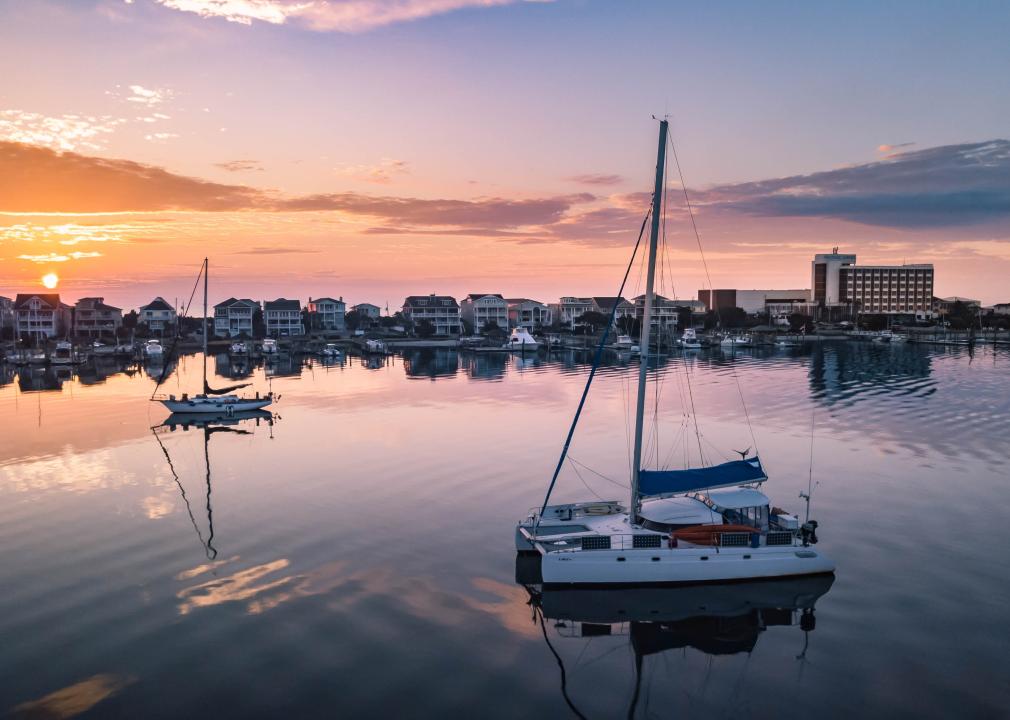The Carolina Loop: Cruise through a perfect weekend of history and nature on the water
Ian McRainey // Shutterstock
The Carolina Loop: Cruise through a perfect weekend of history and nature on the water
Catamaran on glassy water of intercoastal waterway in Wrightsville Beach.
Imagine a weekend: You wake up with a cup of coffee and climb above deck, greeted by early morning mist on the water’s edge, sunlight peeking through cypress trees, and the music of humming cicadas. You’re coasting gently down the river, with nothing but miles of water and natural beauty ahead. Welcome to an idyllic weekend traversing the Carolina Loop, an enticing taste of a yearlong (or more) water journey called the Great Loop.
The Carolina Loop traverses some of the most amazing wetlands in the United States while offering an immersive trip back through the country’s fraught Colonial days. A 110-mile boat trip that will take you on a breezy weekend journey through parts of Virginia and North Carolina, the Carolina Loop can be traveled in any season because of its year-round moderate climate, unlike the frigid winters of the Great Lakes and humid summers of the Florida Everglades.
For a more intimate glimpse of this adventurous experience, GetMyBoat interviewed boaters from all over the U.S. on their perfect weekend getaway through the waterways of North Carolina.
Rediscovering Civil War stories
Starting at Portsmouth, Virginia, and traveling along the Elizabeth River, many boaters will stop for lunch at the small community of Great Bridge in Chesapeake, Virginia, where Battlefield Park sits. The bucolic open space commemorates the Civil War battle known as the Battle of the Great Bridge, the earliest on land in Virginia during the Revolutionary War. The park also tells the story of William “Billy” Flora, a Black soldier whose actions helped Virginia win victory over the British.
After a meal and some sightseeing, travelers continue down the Virginia Cut nearly 40 miles until they reach Coinjock, North Carolina, a favorite for cruisers to stop and rest for the evening. Boaters who have traveled this loop rave about the delicious prime rib at the Coinjock Marina & Restaurant. The marina at Coinjock also makes for a quiet place to enjoy a peaceful night under the stars.
Enjoying the Harbor of Hospitality
The next day, boaters often weave past many crab-trap floats as they head into the mouth of the North River, toward the Albemarle Sound, and up the Pasquotank River, to the small town of Elizabeth City, known as “The Harbor of Hospitality.” This town welcomes travelers with many shops, restaurants, and breweries to explore.
“It was a real pleasure to sit in Adirondack chairs at the river’s edge while sipping a cold local beer at Seven Sounds Brewing Company,” said Troy Hersom, who cruised these waters in the spring of 2023 with his wife, Sandi. The Hersoms also loved the Rose Buddies parties—a tradition of wine-and-cheese dock parties that began in 1983—at the Mariners’ Wharf.
While Jim and Peg Healy found their best memories on firm ground, memorable experiences can be made even on the go. “You don’t always have to stop to find something amazing and interesting while cruising,” Jim said. He and Peg have traveled this area often, sometimes taking family members along to enjoy the trip with them. “We encountered the tall ship Elizabeth II under sail on the Albemarle Sound [the largest open body of water on this journey],” Jim added. Elizabeth II is a stately replica of a Tudor-era sailing ship that traveled the U.S. in the 16th century.
Exploring the Great Dismal Swamp
Northward, through the Great Dismal Swamp, grows dense canopies of cypress and gum trees that turn the waters amber from the tannic acids they secrete. This landscape offers a rare glimpse into the Great Dismal Swamp, a national wildlife refuge housing 47 mammal species such as river otters, black bears, and coyotes, as well as over 200 bird species, including wood ducks, golden eagles, and Canadian geese.
Capt. Chris Caldwell describes his experience on the Great Dismal Swamp as “wild,” with “barely any civilization to disturb the shoreline.” At different points of his journey, Caldwell saw a black bear and a deer swim across the channel. Other boaters described seeing various birds migrating through the swamp, as well as turtles sunbathing on logs near the bank.
Long a hunting site for Indigenous Americans, the Great Dismal Swamp also has a complex history as both a site for the forced labor of enslaved people (when George Washington and his Virginia partners sought to develop the untamed area) and a place of refuge where African Americans and Native Americans hid to escape exploitation. Karen Ratte, a seasoned boater, explained that this area “is almost entirely wild and unpopulated” and that “one can imagine that it looked like this a hundred-plus years ago.”
Boaters often choose to dry their legs and spend a night at the Dismal Swamp Canal Welcome Center, where clean restrooms and open barbecues are available. Travelers often stop for steaks on the grill and to make friends with other cruisers at this common stomping ground. In the morning, boaters say their goodbyes to a leisurely weekend with a trip through the Dismal Swamp Canal and back up the Elizabeth River, ending in Norfolk, Virginia.
The Carolina Loop is an easy, stress-free cruise made perfect for a long weekend. As one of many segments of the Great Loop, it offers a rich national history and abundant natural beauty. Within a few days, boaters can walk the fields of Civil War battles, encounter rare birds migrating through the marshlands, and eat seafood and local fare, all while making friends and memories along the way.
Story editing by Carren Jao. Copy editing by Paris Close. Photo selection by Clarese Moller.
![]()

